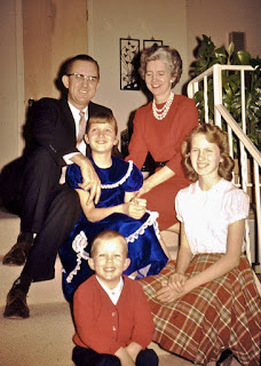 My family, 1963 My family, 1963 I am partial to audio books. They allow me to read while driving or doing a boring job. I can even read with my eyes closed at night. One of the books I “read” this summer was The Help by Kathryn Stockett. I know, you probably read it a couple years ago, or at least saw the movie, but somehow I missed even that. When I finally got around to it, I didn’t want the book to end. Some in the African-American community take exception to it—historical liberties, stereotypes and why is it only the blacks who speak with dialect? (Dialect didn’t bother this northerner; in the audio-book they all had accents.) But by the end of the story those women felt like my friends. I didn’t want to lose them. I wanted to go to Aibileen’s church, praise God with them, and add my offering to their efforts to care for one another. I wanted to sit and pray with her and be sure my grandchildren were on her prayer list. Her faith was so much stronger than Hilly’s vicious form of Christianity that must break Jesus’ heart.
Among other things, The Help is about complicated mother-daughter relationships, and reading it made me think about my own mother. She was not like any of the women in the book—even the nice ones. She was probably as naive as Skeeter, but not as spunky, or as ready to embrace the new. What she did for people was more subtle and behind the scenes. She befriended them. She had a way of seeing everyone as a human being created in the image of God. She was a doctor’s wife, but no one was beneath her, less important in God’s eyes. She modeled graciousness to all. The Help takes place in the early sixties—the time of my childhood. Indianapolis is not nearly as far south as Mississippi. It is a mixture of southern and northern cultures. We had a “negra” woman who cleaned once a week for our family for close to thirty years. Her name was Hester Hill. We children called her Hester. I’m sure it was at her insistence. I can’t imagine my mother instructing us to call her anything less respectful than Mrs. Hill. But then, Hester no doubt had expectations of what working for white people entailed, what was proper. This was early in the Civil Rights movement, and she wouldn’t have wanted to rock the boat and risk her job, as The Help so clearly shows she might. Once or twice in summer when there was no school Hester’s daughter Jacqueline came to play with my sister and me. I remember finding it strange when Jacqueline called me “girl.” I wish now that I had taken better advantage of the opportunity to build a relationship and better understand African American culture, but I was a child, and “different” was a new concept. The visits were not unpleasant, but they were not entirely comfortable. Like the women in The Help, Hester came to my wedding and Mom went to Jacqueline’s, but the friendship went beyond the superficial courtesies—as much as possible in the mid-twentieth century. I remember visiting Hester’s house not far from the urban Indianapolis neighborhood where I lived as an adult. It was shadowy and full of overstuffed furniture. Different, but fascinating. As I recall, Hester was sick. Was my mother taking her a hot meal? I wouldn’t be surprised. Mom made Hester a hot lunch every week. In later years the two sat for hours talking over the meal, speaking about the things of God if I know my mother. Eventually, Hester got a job at Ayres department store. She didn’t tell my mother that she no longer cleaned houses for a living. She simply kept Thursdays as her day off so she could go on cleaning for “Mrs. Smith.” When as adults my husband and I joined Solid Word Bible Church in Indianapolis, I learned that the experiences and family histories of my black brothers and sisters gave them very different perspectives on many things I had always taken for granted. So it is, I’m sure, with a book like The Help. I would love to hear your comments, especially which parts reminded you of your own childhood. But whatever its inadequacies, the book gave me a fresh anger against injustice and a sense of the faith struggle of real people in unjust situations.
1 Comment
LeAnne
1/8/2015 02:45:54 am
This post was moved from another site. All comments were lost.
Reply
Leave a Reply. |
AuthorLeAnne Hardy has lived in six countries on four continents. Her books come out of her cross-cultural experiences and her passion to use story to convey spiritual truths in a form that will permeate lives. Add http://www.leannehardy.net/1/feed to your RSS feed.
To receive an e-mail when I post a new blog, please subscribe.
Categories
All
Archives
November 2022
|
 RSS Feed
RSS Feed